Scottish Study of Early Learning and Childcare: phase 4 report
This report outlines findings from the 4th phase of the Scottish Study of Early Learning and Childcare (SSELC), focusing on two-year-olds who are accessing funded ELC. The SSELC forms a major part of the strategy for the evaluation of the expansion of funded early learning and childcare in Scotland.
6. Views of setting managers
An online questionnaire for heads or managers of participating ELC settings was introduced at Phase 4. This aimed to capture their views on the impact the expansion of funded ELC has had on their setting. The questionnaire included questions on the kinds of support offered to parents, what meals they provide to the children, and issues they have faced with food provision.
6.1 Support provided to families
Setting managers were asked what types of support their setting offered to families of children in their setting – see Table 6.1 below.
Offered to families of Eligible 2s |
Offered to all families |
|
|---|---|---|
% |
% |
|
Support for parents on parenting concerns |
90 |
97 |
Support for parents to help with their child's learning at home |
89 |
93 |
Support within the setting for parents to help their child's speech and language development |
90 |
93 |
Support within the setting for parents to help their child with an(other) additional support need |
82 |
90 |
Provision of clothing for children |
47 |
49 |
Support for maintaining good family relationships |
45 |
48 |
Advice or information for parents to maximise benefits take up |
37 |
41 |
Provision of food for families to eat at home |
39 |
40 |
Provide opportunities for parents to learn / improve skills (e.g. cooking, English language, gardening etc) |
25 |
33 |
Support for parents to develop skills that may help them find employment |
17 |
18 |
Help with finding or maintaining housing |
14 |
16 |
Help with transport to and from the ELC setting |
6 |
8 |
Unweighted bases |
155 |
152 |
Base: All respondents (setting head questionnaire, Phase 4, weighted)
Note: respondents were able to choose more than one response. As such, percentages will not total 100%
In general, responses to the manager questionnaires were the same for most settings, whether answering about the families of all children or just about the Eligible 2s.[32] Post-expansion, most settings reported offering support for parents of all children on parenting concerns (97%), to help their child's speech, language and communication development (93%), to help with their child's learning at home (93%) and to help their child with an(other) additional support need (90%). Other types of support were also offered by some settings, such as provision of clothing for children (49%) and opportunities for parents to learn / improve skills (33%). Table 6.1 provides a list of the supports offered to families of all children and to families of eligible two-year-olds.
To measure managers' perceptions of the ELC expansion's impact on the ability of settings to provide support to families, setting managers were asked the extent to which they agreed or disagreed with three statements:
- "The expansion has helped us to provide a broader range of support for families"
- "The expansion has led us to work more closely with families for whom we provide support"
- "The expansion has led us to spend more time providing support to families".
As shown in Figure 6.1, over half (56%) of setting managers agreed or strongly agreed that the expansion of ELC had helped to provide a broader range of support for families. Just under half (45%) of setting managers agreed that the expansion of ELC had led them to work more closely with families for whom they provide support, similar to the proportion agreeing that it has led them to spend more time providing support to families (47%).
Setting managers were also asked the extent to which they agreed or disagreed with these same statements but in relation to the impact of the cost of living crisis on their ability to provide support to families. Similar to their views on the impact of the expansion, managers were more likely to agree than to disagree with each of the statements on family support (see Figure 6.1).
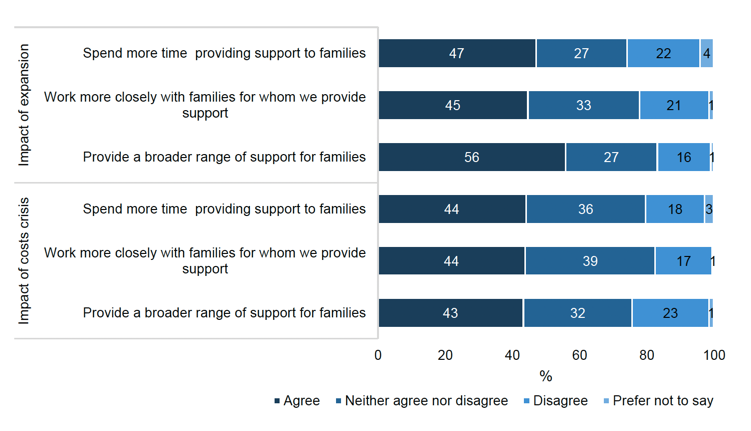
Base: All respondents (setting head questionnaire, Phase 4, weighted)
6.2 Food provision
Setting managers were asked what meals they provided as part of their funded provision, post-expansion. Almost all (98%) settings provided lunch and the majority also provided a morning (87%) or afternoon snack (84%). Just over a third of managers reported providing breakfast (35%) and 19% an early evening meal. Where settings reported providing lunch, managers were asked who was offered lunch as part of funded provision (see Figure 6.2). Over half (54%) said that children who attended morning or afternoon sessions or the full day were all offered lunch. Settings were also asked which meals were offered as optional extras that parents could pay for. The vast majority (89%) said that no such meals were provided and that all meals were provided as part of their funded provision.
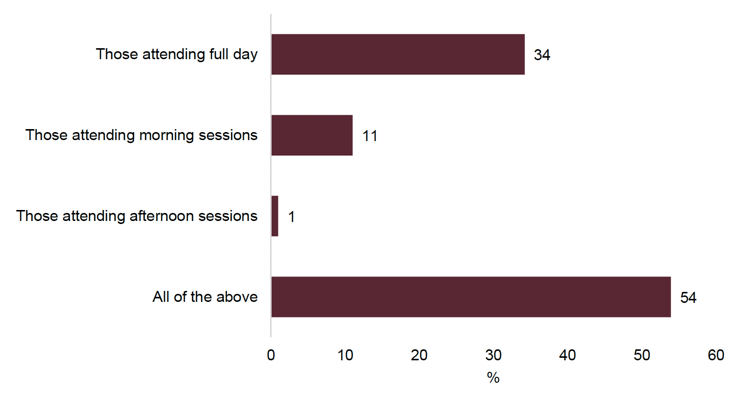
Base: All settings where lunch is offered as part of funded provision (setting heads questionnaire, Phase 4, weighted)
Fifty-eight percent of setting managers reported consulting with parents on meals and snacks. Of those who did, the most common method of consultation was verbal feedback gathered at parent events and meetings (73%). As well as this method, 54% of settings who consulted parents on meals and snacks said they used online or email surveys/feedback questionnaires, 30% used paper surveys/feedback questionnaires posted out or sent home with children, and 12% used paper survey/feedback questionnaires at parent events and meetings.
Setting managers were asked how easy it is to cater to special diets and to provide meals that meet nutritional guidance. The majority (85%) said it was very or fairly easy to cater for special diets with only 8% saying it was very/fairly difficult. Similarly, almost all settings (92%) said it was very/fairly easy to provide meals that met the guidance, with only 2% saying it was difficult.
To explore the main challenges in providing meals in ELC settings, setting managers were shown a list of perceived potential challenges and asked to pick up to three that they considered affected their setting (see Figure 6.3). Around two-thirds (68%) of setting managers mentioned experiencing at least one challenge whilst 32% said they didn't have any challenges in providing meals and snacks in their setting. The most commonly mentioned challenge was the high cost of food (40%), followed by a shortage of staff to support children during snack/mealtimes (20%) and accommodating special diets (19%).
The most common response given by those who said they faced "something else" as a challenge was lack of flexibility in choices of snacks and meals as their food comes from their local authority.
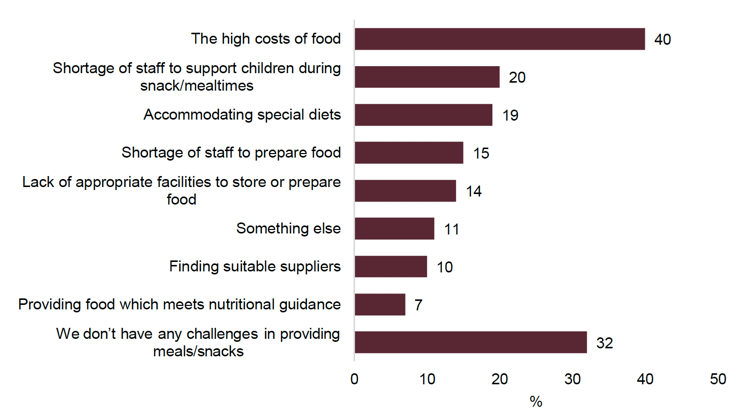
Base: All respondents (setting head questionnaire, Phase 4, weighted)
Managers in settings that offered breakfast and lunch pre- and post-expansion were asked whether they felt the expansion had led to any changes in the quality of food provided. The vast majority (82%) said the expansion did not lead to any changes in the quality of food that they provide whilst 14% said it led to them providing higher quality food for the children. Only 3% said it had resulted in lower quality food. These setting managers were also asked whether the costs crisis had impacted the quality of the food that they offer. Over three-quarters (77%) said that the costs crisis had not had an impact on the quality of food provided by the setting, while similar proportions thought it had led to higher quality and lower quality food for the children (both 12%).
6.3 Activities done and challenges faced by settings in relation to the expansion
Setting managers were asked what their setting had done in order to meet the requirements of the ELC expansion (see Figure 6.4). The most common activities chosen related to staffing with almost three-quarters of settings (72%) taking on extra staff and half (51%) providing additional training to staff. In addition, 40% of settings had lengthened opening hours and a third (33%) had increased the space available.
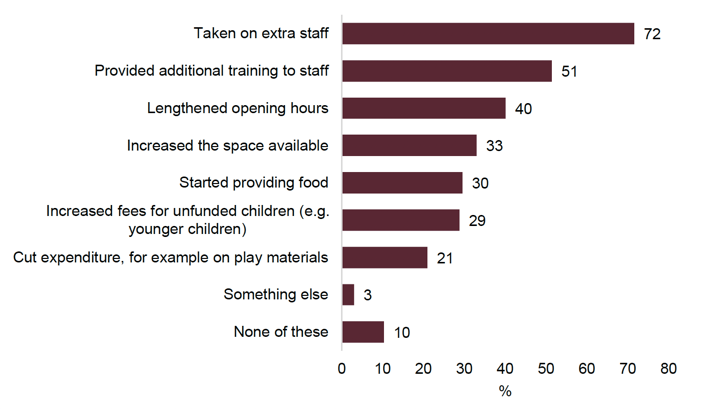
Base: All respondents (setting head questionnaire, Phase 4, weighted)
Setting managers were then asked to select up to three main challenges that they had faced in meeting the requirements of the expansion (see Figure 6.5). Most (94%) setting managers reported facing at least one challenge. The three challenges most commonly mentioned were recruiting staff (59%), accommodating children with additional support needs (53%) and providing flexibility to meet parent needs (33%).
Themes to emerge among those setting managers who reported "something else" as a challenge were challenges associated with recruiting suitable/ good quality staff, and difficulties finding time for all staff to be together due to shift patterns and annual leave.
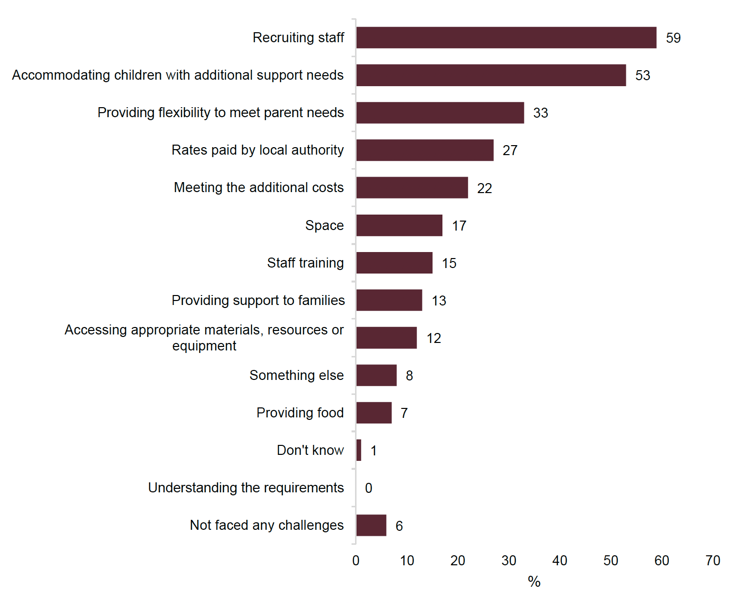
Base: All respondents (setting head questionnaire, Phase 4, weighted)
Contact
Email: socialresearch@gov.scot
There is a problem
Thanks for your feedback